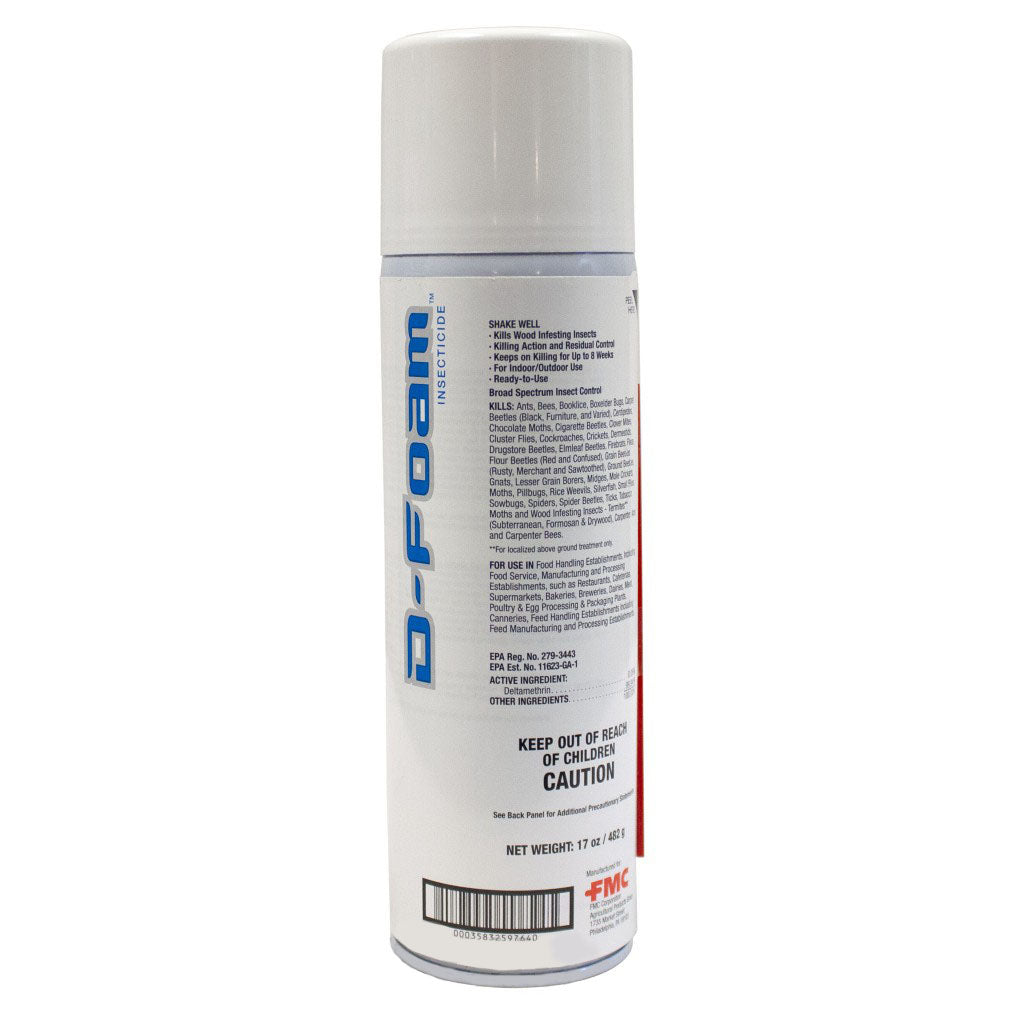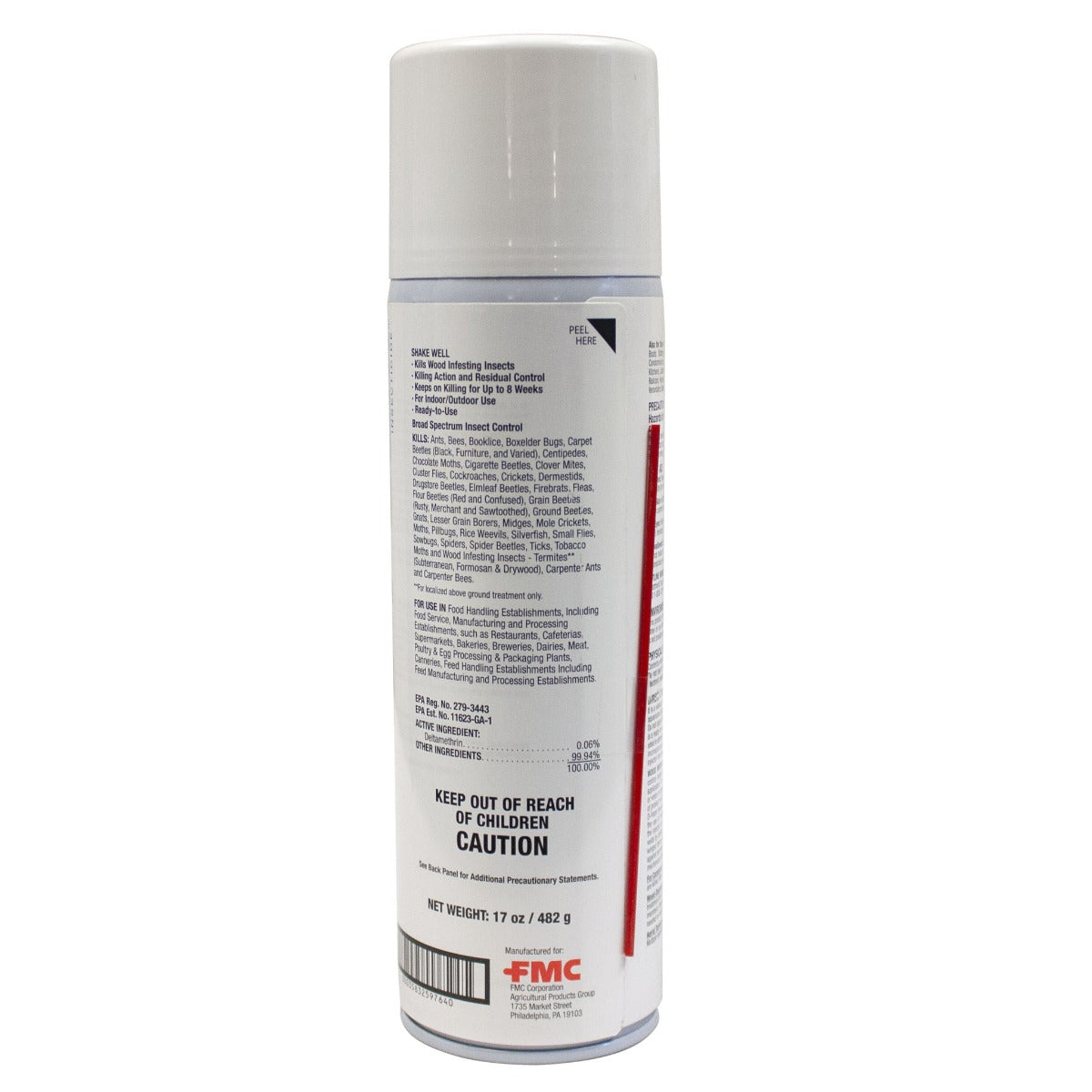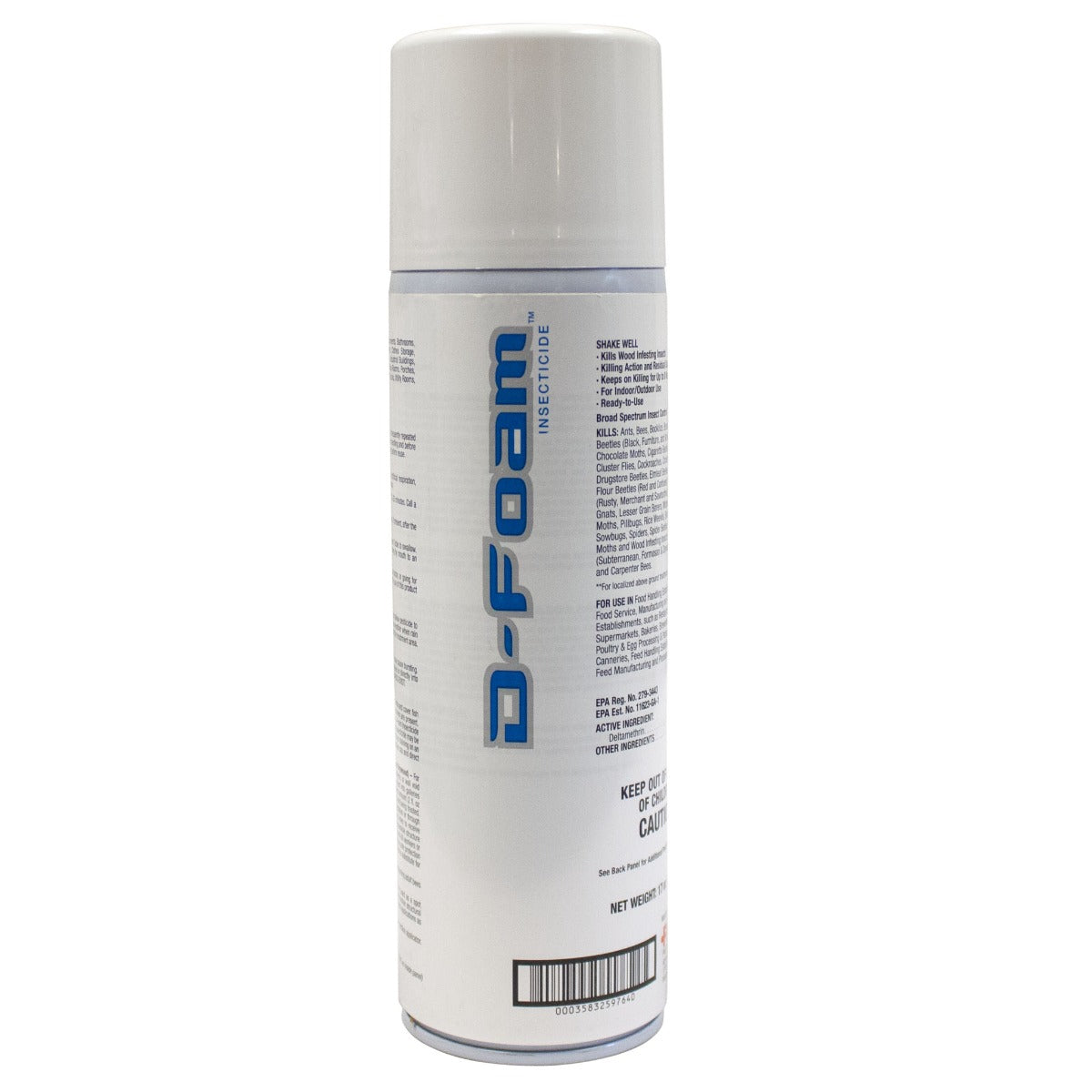Description
- Description
- Specs
- Labels and SDS Forms
D-Foam insecticide kills wood destroying insects hiding in walls, floor joists, and other areas. The active ingredient Deltamethrin, provides residual control of insects for up to 8 weeks after treatment. D-Foam has an expansion ration of 60:1 which reaches even the deepest voids, while using the smallest amount of product. Not only does D-Foam protect against wood destroying insects, it also provides protection of ants, wasps, cockroaches, and many other insects listed on the product label. D-Foam is so potent that it has been proven effective in doses as small as 0.06% and no mixing or dilution is necessary.
For localized above ground treatment only.
FOR USE IN
Food Handling Establishments, Including Food Service, Manufacturing and Processing Establishments, such as Restaurants, Cafeterias, Supermarkets, Bakeries, Breweries, Dairies, Meat, Poultry & Egg Processing & Packaging Plants, Canneries, Feed Handling Establishments Including Feed Manufacturing and Processing Establishments.
Also For Use In Homes, Tents, Aircraft (cargo areas only), Apartments, Atriums, Attics, Automobiles, Basements, Bathrooms, Boats, Bottling Facilities, Buses, Cabins, Campers, Candy Plants, Carports, Cat Sleeping Quarters, Clothes Storage, Condominiums, Decks, Dens, Driveways, Garages, Gazebos, Granaries & Grain Mills, Hospitals, Hotels, Industrial Buildings, Kitchens, Laboratories, Lanais, Living Rooms, Mausoleums, Offices, Parlors, Patios, Pet Sleeping Areas, Play Rooms, Porches, Railcars, Recreational Vehicles, Schools, Ships & Vessels, Solariums, Storage Areas, Sun Rooms, Trailers, Trucks, Utility Rooms, Verandahs, Warehouse and Wineries
WOOD INFESTING INSECTS: Carpenter Ants, Carpenter Bees, Termites (Subterranean, Formosan and Drywood)
For control inside and outside of houses and other structures, apply as a general surface, spot, crack and crevice, or wall void application. To kill wood-destroying insect infestations in localized above-ground areas of the structure, inject into galleries or voids in damaged wood, or into spaces between damaged wooden structural members. Inject a sufficient amount (2 fl. oz of product will produce 1 gallon of foam) to allow for thorough coverage of all surfaces of the construction void being treated. D-Foam Insecticide has an expansion rate of approximately 60:1. Locate galleries by visual signs of infestation or through the use of mechanical sounding techniques. Where necessary, penetrate the galleries or voids by drilling holes to receive the injector tip. Distribute drill holes to adequately treat the infestation. Applications must be made to inaccessible structure voids by drilling and then injecting into the infested void. For termites , the purpose of such applications is to kill workers or winged forms which any may be present in the treated areas at the time of application. Not recommended as sole protection against termites. For active infestations, get a professional inspection. D-Foam Insecticide applications are not a substitute for mechanical alteration, soil treatment or foundation treatment.
Carpenter Bees:
Following treatment, the entrance holes must be left open 24 hours to be certain that returning adult bees are killed. When there is no activity, the hole may be sealed with a suitable sealant.
Wood-Destroying Insects Living Inside Trees, Utility Poles and Fencing:
D-Foam Insecticide must be used as a spot treatment for control of above-ground termites inside trees, utility poles, fencing and decking materials and similar structural members. Wherever possible, locate an inferior infested cavity and inject in the appropriate quantities.Repeat applications as needed to maintain control of re-infestations.
Aerial Termite Carton Nests in Trees:
Termite carton nests in trees must be injected with foam using an injection applicator. Multiple injection points to varying depths may be necessary.
INDOORS
Crack and Crevice, Spot, and Surface Treatments:
For the control of all labeled pests, apply thoroughly to all insect harborage areas, especially in cracks and crevices, and hidden areas around sinks and storage areas, behind baseboards, around doors and windows, behind and under cupboards, cabinets, refrigerators, dishwashers, sinks and stoves, the underside of shelves, drawers, bookcases, furniture and similar areas. Repeat as necessary.
Food/Feed Handling Establishments:
This is for use in Federally Inspected Meat and Poultry Plants as a crack and crevice treatment. Cover or remove exposed food/feed from the treatment area prior to application. All food processing surfaces should be thoroughly washed before use. Do not apply directly to food or food-handling surfaces. Except in federally inspected meat and poultry plants, spot or crack and crevice applications may be made while the facility is in operation. 1 second spray per spot. General surface applications must be used only when the facility is not in operation provided exposed food/feed has been covered or removed prior to application. Food/Feed handling establishments are defined as places other than private residences in which exposed food/feed is held, processed, prepared or served. Included also are areas for receiving, storing, packing (canning, bottling, wrapping, boxing), preparing, edible waste storage and enclosed processing systems (mills, dairies, edible oils, syrups) of food/feed. Serving areas where food/feed is exposed and the facility is in operation are also considered food/feed area.
Non-Food/Non-Feed Areas:
Examples of non-food/non-feed areas include garbage rooms, lavatories, floor drains (to sewers), entries and vestibules, offices, locker rooms, machine rooms, boiler rooms, mop closets and storage (after packaging, canning or bottling).
OUTDOORS
Crack and Crevice, Spot, and Surface Treatments on Outside Surfaces of Buildings:
For the control of all labeled pests, apply to the foundation of buildings where insects are active and may find entrance up to a height of 2 to 3 feet. Construction practices, soil subsidence, and other factors may create situations in which a continuous chemically treated barrier cannot be provided when using conventional liquid applications alone. When necessary, conventional treatments may be supplemented through the use of foam to provide a continuous treated barrier. Applications may be made behind veneers (concrete or wood), piers, chimney bases, into rubble foundations, into block voids, or structural voids, wall voids, under slabs, stoops, porches or to the soil in crawl spaces and other similar voids. Termite carton nests building voids may be injected with foam using an injection applicator. Multiple injection points to varying depths may be necessary. It is desirable to physically remove carton nest material from building voids when such nests are found.
| ACTIVE INGREDIENT | Deltamethrin 0.06% |
| TARGET PESTS | Ants, Bees, Booklice, Boxelder Bugs, Carpet Beetles, Centipedes, Chocolate Moths, Cigarette Beetles, Clover Mites, Cluster Flies, Cockroaches, Crickets, Dermestids, Drugstore Beetles, Elmleaf Beetles, Firebrats, Fleas, Flour Beetles, |
| FOR USE IN | Food Handling Establishments, Homes, Tents, Aircraft, Apartments, Attics, Automobiles, Basements, Bathrooms, Boats, Bottling Facilities, Buses, Cabins, Campers, Candy Plants, Carports, Cat Sleeping Quarters, Clothes Storage, |
| APPLICATION | Shake Well before each use Hold the Can Upright and Remove the Cap Direct the injector into the Crack, Crevice, or Void - and Press Button Down and Apply as Directed on the Label |
| MANUFACTURER | FMC |
| EPA REGISTRATION | 279-3443 |
| NOT FOR SALE TO | AK |
Payment & Security
Your payment information is processed securely. We do not store credit card details nor have access to your credit card information.




